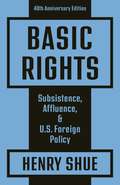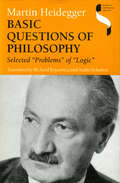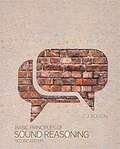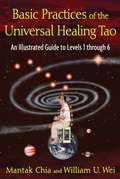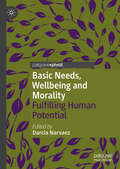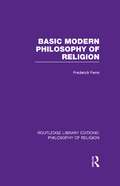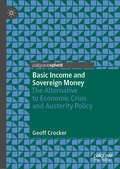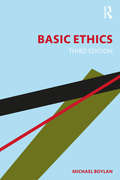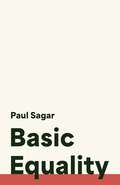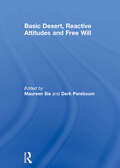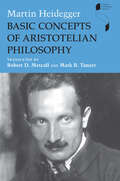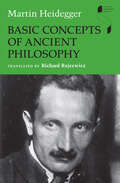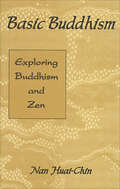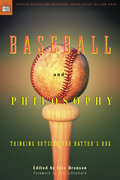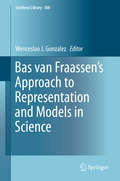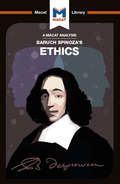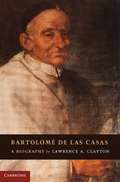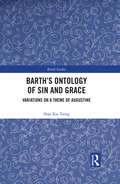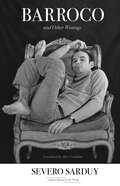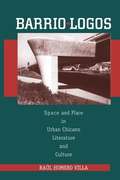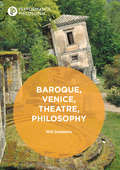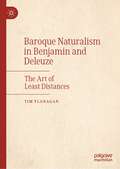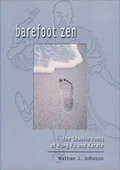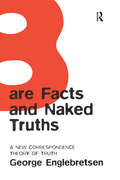- Table View
- List View
Basic Rights: Subsistence, Affluence, and U.S. Foreign Policy: 40th Anniversary Edition
by Henry ShueAn expanded and updated edition of a classic work on human rights and global justiceSince its original publication, Basic Rights has proven increasingly influential to those working in political philosophy, human rights, global justice, and the ethics of international relations and foreign policy, particularly in debates regarding foreign policy’s role in alleviating global poverty. Henry Shue asks: Which human rights ought to be the first honored and the last sacrificed? Shue argues that subsistence rights, along with security rights and liberty rights, serve as the ground of all other human rights. This classic work, now available in a thoroughly updated fortieth-anniversary edition, includes a substantial new chapter by the author examining how the accelerating transformation of our climate progressively undermines the bases of subsistence like sufficient water, affordable food, and housing safe from forest-fires and sea-level rise. Climate change threatens basic rights.
Basic Questions of Philosophy: Selected "Problems" of "Logic" (Studies in Continental Thought)
by Martin Heidegger“This excellent translation” presents Heidegger’s mature thought on the essence of Truth as he was writing his major work, Contributions to Philosophy (Library Journal).This is the first English translation of a lecture course Martin Heidegger presented at the University of Freiburg in 1937–1938. Heidegger’s task here is to reassert the question of the essence of truth, not as a “problem” or as a matter of “logic,” but precisely as a genuine philosophical question, in fact the one basic question of philosophy. Thus, this course is about the essence of truth as well as the essence of philosophy itself.On both sides Heidegger draws extensively upon the ancient Greeks, on their understanding of truth as aletheia and their determination of the beginning of philosophy as the disposition of wonder. In addition, these lectures were presented at the time that Heidegger was composing his second magnum opus, Beiträge zur Philosophie, and provide the single best introduction to that complex and crucial text.
Basic Practices of the Universal Healing Tao: An Illustrated Guide to Levels 1 through 6
by Mantak Chia William U. WeiA comprehensive reference guide to the foundational Taoist practices taught by Master Mantak Chia • Organized by level and chi kung system for quick reference during practice or teaching • Includes 220 exercises from more than 20 of Master Chia’s practice systems, including the Inner Smile, the Six Healing Sounds, the Microcosmic Orbit, Chi Self-Massage, Cosmic Detox, and Iron Shirt Chi Kung • Covers all of the basic exercises in the Universal Tao’s first 6 levels of instruction Organized progressively by level and system for quick reference during practice or teaching, this illustrated guide covers all of the foundational exercises in the Universal Healing Tao’s first 6 levels of instruction. Keyed to the corresponding book for each complete practice, such as Healing Light of the Tao and Chi Self-Massage, this guide includes 220 exercises from more than 20 of Master Mantak Chia’s practice systems, including the Inner Smile, the Six Healing Sounds, the Microcosmic Orbit, Iron Shirt Chi Kung, Wisdom Chi Kung, Tao Yin, Chi Nei Tsang, Cosmic Detox, Bone Marrow Nei Kung, Cosmic Healing, Tendon Nei Kung, and Karsai Nei Kung. Offering a comprehensive reference to the beginning and intermediate practices of the Universal Healing Tao, this book allows you to build a regular Taoist practice combining internal and external chi and sexual energy exercises from the full range of Master Chia’s teachings, enabling you to purify, transform, regenerate, and transcend not only your own energy but the energy around you as well.
Basic Needs, Wellbeing and Morality: Fulfilling Human Potential
by Darcia NarvaezBasic needs fulfilment is fundamental to becoming human and reaching one’s potential. Extending the BUCET list proposed by Susan Fiske - which includes belonging, understanding, control/competence, autonomy, self-enhancement, trust, purpose and life satisfaction - this book demonstrates that the fulfilment of basic needs predicts adult physical and mental health, as well as sociality and morality. The authors suggest that meeting basic needs in childhood vitally shapes one’s trajectory for self-actualization, and that initiatives aimed at human wellbeing should include a greater emphasis on early childhood experience. Through contemporaneous and retrospective research in childhood, the authors argue that basic need-fulfilment is key to the development of the self and the possibility of reaching one’s full potential. This book will be of interest to scholars of human wellbeing and societal flourishing, as well as to health workers and educators.
Basic Modern Philosophy of Religion (Routledge Library Editions: Philosophy of Religion)
by Frederick FerréThis book provides a reasoned, comprehensive understanding of what religion is as well as a clear and critical assessment of whether, in the light of modern developments in philosophy, contemporary thinking people can responsibly maintain religious belief in God. The book is divided into three major sections: the first deals with what all religions may be said to have in common; the second discusses theistic religion and the issue of intellectually responsible belief in God; the third examines current developments within a particular theistic religion, Christianity. Originally published in 1968, the book is basic, both in the nature of the issues it discusses and in the clarity and comprehensiveness of its presentation; it is varied in the arguments and perspectives dealt with; it provides an introduction to philosophical thinking through the problems of philosophy of religion; and it deals seriously with controversial movements in theology.
Basic Income: A Radical Proposal for a Free Society and a Sane Economy
by Philippe Van ParijsProviding a basic income to everyone, rich or poor, active or inactive, was advocated by Paine, Mill, and Galbraith but the idea was never taken seriously. Today, with the welfare state creaking, it is one of the world’s most widely debated proposals. Philippe Van Parijs and Yannick Vanderborght present a comprehensive defense of this radical idea.
Basic Income and Sovereign Money: The Alternative to Economic Crisis and Austerity Policy
by Geoff Crocker“This is a radical, thought-provoking book, which brings together debates that are often kept separate about basic income and 'sovereign money'. You might not agree with all of it, but it makes big arguments and does so with constructive intent: that of proposing alternative ways of organising our economy and welfare states.”Nick Pearce, Director of The Institute for Policy Research, University of Bath, UK“Though I have criticized modern money theory (MMT) for being too facile regarding the consequences of money financed deficits, I welcome this book’s advocacy of a universal basic income. MMT proponents have focused on the problem of employment. Geoff Crocker wants to shift the focus to basic income, and I believe he is right. We are in an era of transition. Employment was the fundamental problem of the 20th century. Income distribution will be the fundamental problem of the 21st century. We must begin transitioning the policy discourse now. In coming decades we will need both employment and basic income policy. It is good to have MMT advocates on board.”Thomas Palley, independent economist, Washington, DC, USA"Geoff Crocker's book is a very stimulating and provoking contribution to the discussion of how to define, identify, and finance basic income. It addresses very clearly the societal issue of a monetary basic income funding which will excite the discussion beside well --known tax proposals, and establishes the discussion on integrating basic income directly into crisis prevention and crisis solution."Bernhard Neumärker, Götz Werner Professor of Economic Policy & Constitutional Economic Theory and Head of Freiburg Institute for Basic Income Studies (FRIBIS) at the University of FreiburgThe current economic system is dysfunctional, characterised by crises, austerity, excessive household and government debt, low pay, poverty, inequality, and ecological damage. This needs a radical re-think and re-engineering of the economic system. The standard explanation of the 2007 economic crisis is that banks behaved badly and governments failed to regulate. But policies of tighter bank regulation, quantitative easing, and austerity failed, and proved counter-productive. This book challenges this orthodox view. From a careful analysis of long-term economic data, it shows that earned income has inexorably fallen behind economic output, leading to huge increases in consumer debt, causing the crisis. Governments have sought to curtail deficit spending by socially harmful austerity policy. The answer is a universal basic income, funded by debt-free sovereign money, which also funds government social expenditure, always limited by economic output to avoid inflation. This book will appeal to policy makers, academic economists, think tank networks, and everyone who is concerned with the ongoing dysfunctionality of the current economic system.
Basic Ethics: An Applied Philosophical Approach (Basic Ethics In Action Ser.)
by Michael BoylanBasic Ethics presents for a wide range of students and other interested readers the questions raised in thinking about ethical problems, the answers offered by moral philosophy, and the means to better integrate into both the reader’s world and personal life. It takes up what the author calls a "worldview theory," which shows readers how to begin with the values and understanding of the world that they already possess in order to transition from there to new levels of increasing ethical awareness. Updates to the third edition include the more thorough integration of feminist ethics into the principal theoretical traditions, a new chapter on the ethical responsibility to be well informed of current events, expanded coverage of human rights, and additional opportunities on how to use ethical reasoning in thinking about one’s own life and about public policy. Key Features: Links personal values to a philosophical treatment of the major ethical theories Presents ethics in the context of social/political issues that face our nation and the world Challenges the student to react to the presented material through critical exercises that may be used as weekly assignments and can form the basis of class discussion and evaluation. Engages the student to think about underlying issues first (in the basic questions) before presenting the most popular solutions (in the basic answers) Invites the reader to make up her own mind on how to formulate an ethical theory that will help her in her own life Offers a 16-chapter format to fit into most college-semester calendars Presents an overall structure that establishes foundational problems in ethical theory in the first section of the book that are variously addressed by the different ethical theories in the second section of the book Highlights key terms to help the reader grapple with issues raised (which are reviewed and defined in a final Glossary) Includes a final chapter designed to help students comprehend the book in its entirety. Updates to the Third Edition: Highlights new research on human rights and their relevance to ethical thinking and contemporary moral issues Integrates feminist ethics into the principal theoretical traditions: virtue ethics, ethical intuitionism, and some versions of deontology Provides new coverage of "fake news" and the moral responsibility to be well and accurately informed of current events Expands opportunities to use ethical reasoning in thinking about one’s own life and about public policy.
Basic Equality
by Paul SagarAn innovative argument that vindicates our normative commitment to basic equality, synthesising philosophy, history, and psychologyWhat makes human beings one another&’s equals? That we are "basic equals" has become a bedrock assumption in Western moral and political philosophy. And yet establishing why we ought to believe this claim has proved fiendishly difficult, floundering in the face of the many inequalities that characterise the human condition. In this provocative work, Paul Sagar offers a novel approach to explaining and justifying basic equality. Rather than attempting to find an independent foundation for basic equality, he argues, we should instead come to see our commitment to this idea as the result of the practice of treating others as equals. Moreover, he continues, it is not enough to grapple with the problem through philosophy alone—by just thinking very hard, in our armchairs; we must draw insights from history and psychology as well.Sagar writes that, as things stand, there appear to be no good arguments for believing in the truth of basic equality. Indeed, for much of Western intellectual history and social practice, basic inequality has been the default position. How is it then, Sagar asks, that in Western societies, in a period of less than a century, basic equality emerged as the dominant view? Sagar approaches this not as a mere philosophical puzzle, but as a dramatic historical development. In so doing, he shows us what is at stake when human beings treat one another as equals just because they are human beings.
Basic Desert, Reactive Attitudes and Free Will
by Maureen Sie and Derk PereboomBasic Desert, Reactive Attitudes and Free Will addresses the issue of whether we can make sense of the widespread conviction that we are morally responsible beings. It focuses on the claim that we deserve to be blamed and punished for our immoral actions, and how this claim can be justified given the philosophical and scientific reasons to believe that we lack the sort of free will required for this sort of desert. Contributions to the book distinguish between, and explore, two clusters of questions. The first asks what it is to deserve to be harmed or benefitted. What are the bases for desert – actions, good character, bad character, the omission of good character traits? The second cluster explores the disagreement between compatabilists and incompatibilists surrounding the nature of desert. Do we deserve to be harmed, benefitted, or judged, even if we lack the ability to act differently, and if we do not, what effect does this have on our everyday actions? Taken in full, this book sheds light on the notion of desert implicated in our practice of holding each other morally responsible. This book was originally published as a special issue of Philosophical Explorations.
Basic Concepts of Aristotelian Philosophy (Studies in Continental Thought)
by Martin HeideggerThis volume presents Heidegger’s 1924 Marburg lectures which lay the intellectual groundwork for his magnum opus, Being and Time.Here are the seeds of the ideas that would become Heidegger’s unique and highly influential phenomenology. Heidegger interprets Aristotle’s Rhetoric and looks closely at the Greek notion of pathos. These lectures offer special insight into the development of his concepts of care and concern, being-at-hand, being-in-the-world, and attunement, which were later elaborated in Being and Time.Available in English for the first time, these lectures make a significant contribution to ancient philosophy, Aristotle studies, Continental philosophy, and phenomenology.
Basic Concepts of Ancient Philosophy (Studies in Continental Thought)
by Martin Heidegger Richard RojcewiczBasic Concepts of Ancient Philosophy presents a lecture course given by Martin Heidegger in 1926 at the University of Marburg. First published in German as volume 22 of the collected works, the book provides Heidegger's most systematic history of Ancient philosophy beginning with Thales and ending with Aristotle. In this lecture, which coincides with the completion of his most important work, Being and Time, Heidegger is working out a way to sharply differentiate between beings and Being. Richard Rojcewicz's clear and accurate translation offers English-speaking readers valuable insight into Heidegger's views on Ancient thought and concepts such as principle, cause, nature, unity, multiplicity, Logos, truth, science, soul, category, and motion.
Basic Buddhism: Exploring Buddhism and Zen
by Nan Huai-ChinFrom a Chinese religious scholar, the history of Buddhism from its beginnings in sixth-century India to twentieth-century global practices.Nan Huai Chin, a learned representative of the Chinese Buddhist tradition, explores the many different schools of Buddhism and the many stories surrounding the life of Buddha. He explains various philosophical trends in Buddhism and the aspects it has taken on throughout Asia, Europe, and America. For a solid understanding of Buddhism, this book is indispensable reading. With index.
Baseball and Philosophy
by William Irwin Bill Littlefield Eric BronsonBaseball and Philosophy brings together two high-powered pastimes: the sport of baseball and the academic discipline of philosophy. Eric Bronson asked eighteen young professors to provide their profound analysis of some aspect of baseball. The result offers surprisingly deep insights into this most American of games.The contributors include many of the leading voices in the burgeoning new field of philosophy of sport, plus a few other talented philosophers with a personal interest in baseball. A few of the contributors are also drawn from academic areas outside philosophy: statistics, law, and history.This volume gives the thoughtful baseball fan substancial material to think more deeply about. What moral issues are raised by the Intentional Walk? Do teams sometimes benefit from the self-interested behavior of their individual members? How can Zen be applied to hitting? Is it ethical to employ deception in sports? Can a game be defined by its written rules or are there also other constraints? What can the U.S. Supreme Court learn from umpiring? Why should baseball be the only industry exempt from antitrust laws? What part does luck play in any game of skill?
Bas van Fraassen's Approach to Representation and Models in Science (Synthese Library #368)
by Wenceslao J. GonzalezThis book analyzes Bas van Fraassen's characterization of representation and models in science. In this regard, it presents the philosophical coordinates of his approach and pays attention to his structural empiricism as a framework for his views on scientific representations and models. These are developed here through two new contributions made by van Fraassen. In addition, there are analyses of the relation between models and reality in his approach, where the complexity of this conception is considered in detail. Furthermore, there is an examination of scientific explanation and epistemic values judgments. This volume includes a wealth of bibliographical information on his philosophy and relevant philosophical issues. Bas van Fraassen is a key figure in contemporary philosophy of science, as the prestigious Hempel Award shows. His views on scientific representation offer new ideas on how it should be characterized, and his conception of models shows a novelty that goes beyond other empiricists' approaches of recent times. Both aspects -- the characterization of scientific representation and the conception of models in science -- are part of a deliberate attempt to forge a "structural empiricism," an alternative to structural realism based on an elaborated version of empiricism.
Baruch Spinoza's Ethics (The Macat Library)
by Andreas Vrahimis Gary SlaterBaruch Spinoza’s Ethics is a dense masterpiece of sustained argumentative reasoning. It earned its place as one of the most important and influential books in Western philosophy by virtue of its uncompromisingly direct arguments about the nature of God, the universe, free will, and human morals. <P><P>Though it remains one of the densest and most challenging texts in the entire canon of Western philosophy, Ethics is also famous for Spinoza’s unique approach to ordering and constructing its arguments. As its full title – Ethics, Demonstrated in Geometrical Order – suggests, Spinoza decided to use the rigorous format of mathematical-style propositions to lay out his arguments, just as the Ancient Greek mathematician Euclid had used geometrical propositions to lay out the basic rules of geometry. <P><P>In choosing such a systematic method, Spinoza’s masterwork shows the crucial aspects of good reasoning skills being employed at the highest level. The key use of reasoning is the production of an argument that is well-organised, supports its conclusions and proceeds logically towards its end. Just as a mathematician might demonstrate a geometrical proof, Spinoza sought to lay out a comprehensive philosophy for human existence – an attempt that has influenced generations of philosophers since.
Bartolomé de las Casas
by Lawrence A. ClaytonThe Dominican priest Bartolomé de las Casas (1485-1566) was a prominent chronicler of the early Spanish conquest of the Americas, a noted protector of the American Indians and arguably the most significant figure in the early Spanish Empire after Christopher Columbus. Following an epiphany in 1514, Las Casas fought the Spanish control of the Indies for the rest of his life, writing vividly about the brutality of the Spanish conquistadors. Once a settler and exploiter of the American Indians, he became their defender, breaking ground for the modern human rights movement. Las Casas brought his understanding of Christian scripture to the forefront in his defense of the Indians, challenging the premise that the Indians of the New World were any less civilized or capable of practising Christianity than Europeans. Bartolomé de las Casas: A Biography is the first major English-language and scholarly biography of Las Casas' life in a generation.
Barth's Ontology of Sin and Grace: Variations on a Theme of Augustine (Barth Studies)
by Shao Kai TsengIn recent Barth studies it has been argued that a key to understanding the theologian’s opposition to natural theology is his rejection of substantialist ontology. While this is true to an extent, this book argues that it is a mistake to see Barth’s ‘actualistic ontology’ as diametrically opposed to traditional substantialism. Probing into Barth’s soteriological hamartiology in Church Dogmatics, III-IV, a largely neglected aspect of these volumes in recent debates on his understanding of being and act, it shows how his descriptions of sin, nature, and grace shed light on the precise manners in which his actualistic ontology operates on both a substance grammar of being and a process grammar of becoming, while rejecting the metaphysics underlying both grammars. Looking at issues such as original sin, universal salvation and human will, Barth is shown to be radically redefining the relationship between humans, their actions and the divine. This book argues that human ‘nature’ is the total determination of the human being ‘from above’ by God’s grace in Christ, while the existential dimension of the human being is also totally determined ‘from below’ by the Adamic history of sin. This serves to demonstrate Barth’s endeavours in eliminating the vestiges of natural theology within the Western tradition handed down from Augustine. By exploring these issues this book offers a fresh insight into Barth’s relationship with his theological forbears. As such, it will be vital reading for any scholar of Barth studies, the problem of evil, and theological ontology.
Barroco and Other Writings (Cultural Memory in the Present)
by Severo SarduySevero Sarduy was among the most important figures in twentieth-century Latin American fiction and a major representative of the literary tendency to which he gave the name Neobaroque. While most of Sarduy's literary work is available in English, his theoretical writings have largely remained untranslated. This volume—presenting Sarduy's central theoretical contribution, Barroco (1974), alongside other related works—remedies that oversight. Barroco marks a watershed in postwar thought on the Baroque, both in French post-structuralism and in the Latin American context. Sarduy traces a double history, reading events in the history of science alongside developments in the history of art, architecture, and literature. What emerges is a theory of the Baroque as decentering and displacement, as supplement and excess, a theory capacious enough to account for the old European Baroque as well as its queer, Latin American and global futures. In addition to Barroco, this volume includes texts spanning Sarduy's career, from 1960s essays published originally in Tel Quel to late works from the 1980s and '90s. It thus offers a complete picture of Sarduy's thinking on the Baroque.
Barrio-Logos: Space and Place in Urban Chicano Literature and Culture
by Villa Raúl HomeroStruggles over space and resistance to geographic displacement gave birth to much of Chicano history and culture. In this pathfinding book, Raúl Villa explores how California Chicano/a activists, journalists, writers, artists, and musicians have used expressive culture to oppose the community-destroying forces of urban renewal programs and massive freeway development and to create and defend a sense of Chicano place-identity.
Baroque, Venice, Theatre, Philosophy (Performance Philosophy)
by Will DaddarioThis book theorizes the baroque as neither a time period nor an artistic style but as a collection of bodily practices developed from clashes between governmental discipline and artistic excess, moving between the dramaturgy of Jesuit spiritual exercises, the political theatre-making of Angelo Beolco (aka Ruzzante), and the civic governance of the Venetian Republic at a time of great tumult. The manuscript assembles plays seldom read or viewed by English-speaking audiences, archival materials from three Venetian archives, and several secondary sources on baroque, Renaissance, and early modern epistemology in order to forward and argument for understanding the baroque as a gathering of social practices. Such a rethinking of the baroque aims to complement the already lively studies of neo-baroque aesthetics and ethics emerging in contemporary scholarship on (for example) Latin American political art.
Baroque Naturalism in Benjamin and Deleuze: The Art of Least Distances
by Tim FlanaganThis book, itself a study of two books on the Baroque, proposes a pair of related theses: one interpretive, the other argumentative. The first, enveloped in the second, holds that the significance of allegory Gilles Deleuze recognized in Walter Benjamin’s 1928 monograph on seventeenth century drama is itself attested in key aspects of Kantian, Leibnizian, and Platonic philosophy (to wit, in the respective forms by which thought is phrased, predicated, and proposed).The second, enveloping the first, is a literalist claim about predication itself – namely, that the aesthetics of agitation and hallucination so emblematic of the Baroque sensibility (as attested in its emblem-books) adduces an avowedly metaphysical ‘naturalism’ in which thought is replete with predicates. Oriented by Barbara Cassin’s development of the concerted sense in which homonyms are critically distinct from synonyms, the philosophical claim here is that ‘the Baroque’ names the intervallic [διαστηµατική] relation that thought establishes between things. On this account, any subject finds its unity in a concerted state of disquiet – a state-rempli in which, phenomenologically speaking, experience comprises as much seeing as reading (as St Jerome encountering Origen’s Hexapla).
Barefoot Zen: The Shaolin Roots of Kung Fu and Karate
by Nathan J. JohnsonJohnson makes the Shaolin way legacy accessible to all, releasing the art from the clutches of popular images and painful concerns about self-defense.Barefoot Zen is a brave new approach to the martial arts, which clearly demonstrates that the traditional movements of both Kung Fu and Karate, contained in the solo choreographed sequences of movements known as forms (or kata), grew out of the spiritual practices of the Shaolin order of Buddhist monks and nuns. Nathan Johnson explains that this mystical and non-violent teaching is a profound and beautiful expression of Chan (Zen) Buddhism and its pursuit of wisdom, peace, and enlightenment. Contrary to popular assumption, he contends that it was never intended to be an actual means of self-defense. Barefoot Zen bridges the gap between Kung Fu and Karate, and reveals their common origin through the disclosure of vital research material on three of the world’s most important Karate kata.Part I explains the spiritual disciplines that contributed to what we know as the martial arts. Part II explains the creation of the art along with practical instruction for performing kata. Part III explains the formation of many of the world’s Kung Fu styles.We learn that the original “empty hand art” was used as a method of kinetic meditation between pairs and was designed as a practical tool to assist practitioners in transcending the fear and insecurity of everyday living. The legendary courage of the Shaolin (Chan/Zen) order was not developed by fighting with enemies, but by not fighting!The Shaolin teaching was designed to free us from fear, the only true enemy.
Bare Facts and Naked Truths: A New Correspondence Theory of Truth
by George EnglebretsenThe very idea of truth as a substantial and meaningful concept has been under attack recently from advocates of New Age and postmodern theories. In this book Englebretsen defends the notions of truth and objectivity as key to the scientific view of the natural world and presents an original defence of the 'commonsense' correspondence theory of truth. Englebretsen's approach overcomes the traditional difficulties of correspondence theories of truth with providing adequate and convincing accounts of truth-bearers, truth-makers and the correspondence relation between them by taking truth-bearers to be propositions and facts as constitutive properties of the world. This accessibly written book surveys all of the major competing theories of truth (coherence, pragmatic, redundancy, semantic, deflationary, disquotational, minimalist) before formulating the new defence of the correspondence theory and then exploring the consequences of the theory for issues in epistemology and ontology. The book concludes by showing how the idea of 'propositional depth' can be used to dissolve the Liar paradoxes.
